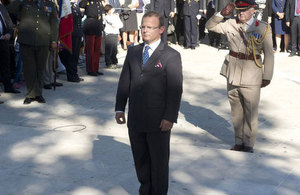British Ambassador on the 187th anniversary of Navarino Battle in Greece
Ambassador John Kittmer was in Navarino on Monday 20 October to participate in the commemoration of the 187th anniversary of the Navarino Battle.

navarino
The naval battle of Navarino, on the west coast of the Peloponnese peninsula, was fought on 20 October 1827. An Ottoman armada of Turkish, Egyptian and Tunisian forces, was destroyed by an Allied force of British, French and Russian vessels.
In his speech Ambassador Kittmer highlighted the courage and sacrifice of the great men who fought at Navarino inspired by the liberal ideals of the Greek Revolution. He also underlined the strong ties between the two people who share a deep culture, history and an abiding passion for freedom and democracy and stressed the importance of standing together now and in the years ahead.
In his speech the Ambassador said:
One hundred and eighty-seven years ago today, after many breaches of faith by Ibrahim Pasha, Sir Edward Codrington, commanding his flagship Asia, led 11 British ships, 7 French ships and 8 Russian ships into Navarino Bay. Their fleet was outnumbered by the Turkish, Egyptian and Tunisian forces at anchor in the bay. Admirals Codrington, De Rigny and Heiden were determined to halt Ibrahim’s devastation of the Peloponnese and prevent his fleet from attacking Greek naval forces at Hydra and Spetses. They wanted to dictate his return to Egypt. We here all know what happened that day. For me, therefore, it is a great privilege to be talking to you today. I was sixteen when I first came here, over 30 years ago. My schoolmaster, a man of deep learning and profound love for Greece, took my fellow pupils and me on to the waters of the bay, to visit the memorials to the British, Russian and French fleets, and to teach us about the basis of modern Greece. My teacher was proud of the role that Britain had played in liberating Greece. He taught us the great names: Lord Byron, Captain Hastings, in his small steamship, the Karteria, Sir Richard Church, Admiral Codrington.
These great men were inspired by the liberal ideals of the Greek Revolution. They wanted Greeks to be free. They demanded and fought for the ideal of the freedom of Greece. My teacher wanted us to be proud of what these British philhellenes had done. But more than that. He wanted us to understand the price that was paid. Here at Navarino, we should understand the terror of naval warfare. How it must have felt, to engage in a broadsides naval battle. The smoke, the deafening roar of the cannon, the risk of fire, terrible fire. Drawn up in the shape of a horseshoe, the Ottoman forces were disposed of brave men. Although they had more ships and more personnel, they faced no fewer than ten ships of the line, each capable of delivering huge broadsides. They say that the three English ships of the line fired 120 imperial tons of shot in four hours. And our teacher asked to imagine the sentiments of the British, Russian and French sailors, as they entered the narrow strait and engaged forces three times their size. These men too were brave, very brave. And they prevailed.
Here, at Navarino Bay, Greece ceased to be just an idea and became a nation. Since that day, Britain and Greece have never ceased to be friends. Like all good friends, we sometimes quarrel and we sometimes fail to understand each other. Sometimes our interests diverge. But we are always brought back together around some basic facts. We are two, geographically small seafaring nations at the edge of Europe, with deep culture, history and an abiding passion for freedom and democracy. At our best, we look outwards and we relish adventure. We stand together now in our military and economic alliances as we stood together in 1827. And, I have to tell you, we will need to stand together no less in the years ahead. Here, 174 French, Russian and British sailors died for the freedom of Greece. They paid the ultimate price. I am proud, and I know you are proud, of what they and their comrades did. Let us remember them always. Thank you for your attention.